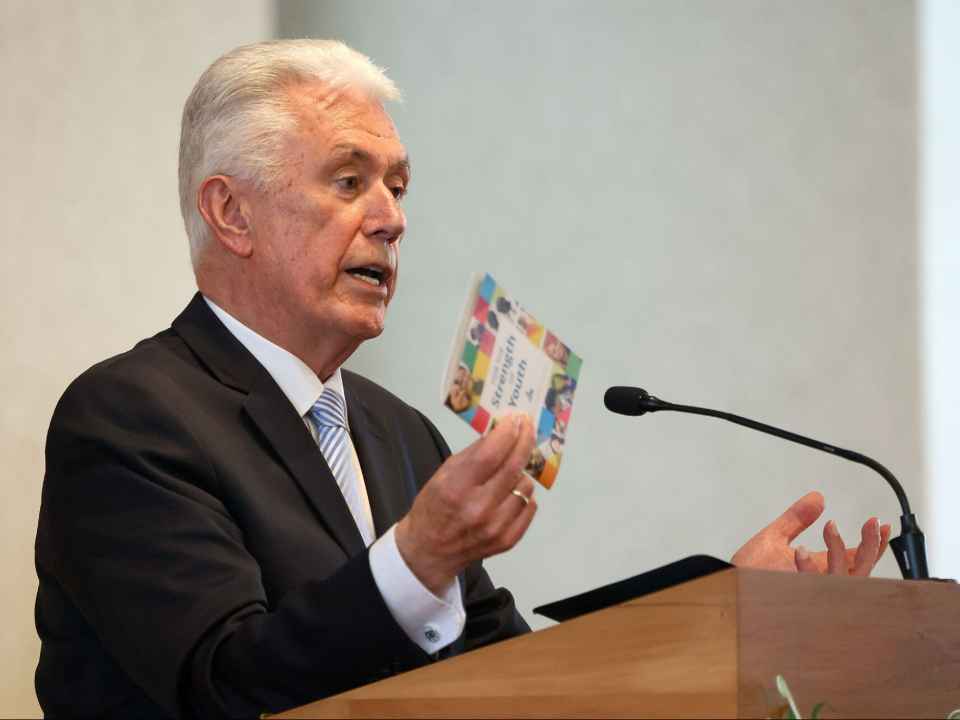
For-the-Strength-of-Youth
Cover of "For the Strength of Youth: A Guide for Making Choices."2023 by Intellectual Reserve, Inc. All rights reserved.This story appears here courtesy of TheChurchNews.com. It is not for use by other media.
By Brother John G. Bytheway of the Young Men General Advisory Council
One year ago, the “For the Strength of Youth” guide was introduced at general conference.
Some parents and leaders may still wonder how to speak with youth about the principles taught in the guide. Here are some thoughts and ideas that might help.
What Is Your ‘Attitude’?
Pilots refer to an airplane’s position in the air as its “attitude.” Is the airplane nose-up or nose-down? Climbing or diving? Is it in a turn or cruising straight and level? An attitude can also mean a mindset, or an approach to dealing with the ups and downs of life. An old saying about both flying and life is this: “Our attitude determines our altitude.”

For-the-Strength-of-Youth
Elder Dieter F. Uchtdorf of the Quorum of the Twelve Apostles holds a FSY guide booklet while speaking during a missionary devotional at the David O. McKay Stake and Cultural Events Center at in Hamilton, New Zealand, on Friday, October 14, 2022. Photo by Kristin Murphy, courtesy of Church News.Copyright 2023 Deseret News Publishing Company.Nowhere is our attitude more important than in our response to the words of the scriptures, words of the living prophets, and inspired counsel from Church leaders. Our attitude regarding the FSY guide can be life-changing and can affect whether we will soar to new heights or sink to a lower level.
What will our attitude be as we read the guide? Jesus said, “Blessed are the meek” (Matthew 5:5) in the Beatitudes. Here are three attitudes that can help us measure our progress in becoming meek.
1. How bad can I be?
Those with this attitude say, “Where is the line? I want to live as close to it as possible without crossing over it.” This is a little like asking where does “good” end and “bad” begin. It is as dangerous as a skydiver asking, “How close can I get to the ground before opening my parachute?”
2. How good do I have to be?
This attitude is looking for a minimum of behavior, requiring the least possible effort. This is like asking a teacher, “What is the least I can do and still pass the class?” Many years ago, Elder Carlos E. Asay warned, “There is a lie — a vicious lie — circulating among the Latter-day Saints and taking its toll among the young. And it is that a ‘balanced [person]’ is one who deliberately guards against becoming too righteous” (April 1992 general conference). It is like the skydiver saying, “I want to do a good job packing my parachute, but not that good.”
3. How valiant can I be?
I once met a 15-year-old boy in Arkansas who told me he went to seminary at 5 a.m. I said, “That is super early. Why do you go?” He paused, seemed surprised at the question, and simply answered, “Because I want to. I love it. Seminary is the best part of my day.” His attitude wasn’t a question, it was a statement — “I want to be valiant!” For him, obedience was a quest, not an irritation.
That is like the skydiver saying, “I pack my parachute carefully and open it long before I hit the ground because I love to skydive and want to keep doing it.” That kind of attitude will help us soar.
When Aaron taught King Lamoni’s father in the Book of Mormon, the old king offered a beautiful prayer which perfectly expresses the third attitude:
“O God, Aaron hath told me that there is a God. And if there is a God, and if thou art God, wilt thou make thyself known unto me? And I will give away all my sins to know thee ...” (Alma 22:18).
The king did not say, “How bad can I be and know thee?” or “Exactly how good do I have to be to know thee?” No, his attitude was “I will give away all my sins to know thee.”
The FSY guide was not written to explain minimums of behavior, but doctrines of discipleship. It is truly the next level. President Russell M. Nelson is asking us to learn to “hear Him” and then “let God prevail.”
‘Higher and Holier Habits’
The Lord is trusting us not to look for loopholes, but for higher and holier habits. Let’s not ask, “What will God permit?” but “What would God prefer?” The second question reveals the willing heart that the Lord desires each of us to develop as He teaches us to be meek.
In a recent fireside for youth, Young Men General President Steven J. Lund expressed the proper attitude toward the FSY guide: “God’s expectations didn’t change, but the responsibility for understanding those expectations has shifted to you.” If something is not spelled out as clearly in the FSY guide as we were expecting, we can prayerfully ask God how He would prefer that we proceed.
If I get in an airplane, I do not want the pilot to be asking “How bad can I be?” or even “How good do I have to be?” I want him or her to be asking, “How valiant can I be?” In flying and in life, attitude will determine our altitude.